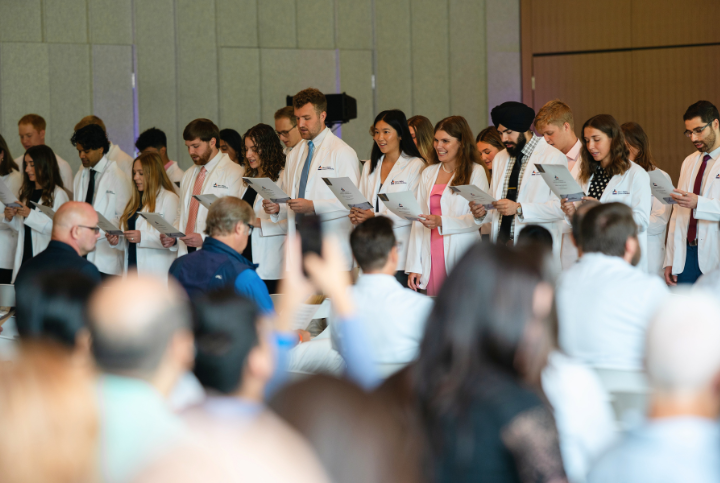What Med School Accreditation Means — and Why It Matters for Your Future
July 30, 2025

When it comes to choosing a medical school, accreditation is one of the most important — yet often overlooked — factors that can shape your future. Accreditation affects everything from your ability to get federal financial aid to your eligibility for residency programs after graduation. For aspiring physicians, it’s not just a formality. It’s the foundation for a successful medical career.
At Alice L. Walton School of Medicine, accreditation is an active, transparent process — one that reflects our commitment to excellence and accountability as we train the next generation of physicians.
What Is Medical School Accreditation?
Accreditation is a rigorous evaluation process that ensures a medical school meets nationally accepted standards for quality education. It falls into two key categories:
- Institutional Accreditation evaluates the school as a higher education institution. It ensures student eligibility for federal financial aid (for example, Pell Grants) under Title IV of the Higher Education Act, and confirms that the school is operating with proper academic and administrative oversight.
- Programmatic Accreditation focuses specifically on the quality of the Doctor of Medicine (MD) program. In the United States, this accreditation is granted by the Liaison Committee on Medical Education (LCME), the official accrediting body for MD-granting medical schools that is recognized by the U.S. Department of Education.
Both forms of accreditation work together to give students confidence that their education meets the highest standards.
What Does Accreditation Mean for Medical Students?
Accreditation isn’t just about the school — it’s about your future.
- Eligibility for Federal Student Aid: Without institutional accreditation, students cannot access federal financial aid, including loans under Title IV programs.
- Licensure and Board Exams: Enrollment in LCME-accredited schools is required for eligibility to participate in the United States Medical Licensing Examination (USMLE) sequence, the critical series of tests required for medical licensure.
- Residency Placement: Because LCME accreditation requires evidence of high educational quality, graduating from an LCME-accredited school can be a significant advantage for entry into competitive residency programs. Residency directors look for candidates with strong academic foundations and proven clinical readiness, both of which are signaled by attending an accredited program.
- For graduates of U.S. MD-granting medical schools, LCME accreditation is a requirement for licensure in all states and most U.S. territories.
In short, accreditation opens doors — to funding, licensure, and a successful residency match. More than that, it ensures you’re getting a high-quality education built to prepare you for real-world care, lifelong learning, and long-term success in medicine.
Where AWSOM Stands in the Process
As a stand-alone medical school, Alice L. Walton School of Medicine is pursuing both institutional and programmatic accreditation to support our MD program and our students.
- Institutional Accreditation: The School is currently seeking institutional accreditation through a federally recognized agency. This is required to participate in federal student aid programs and reflects the School’s strength as an educational institution.
- State Authorization: AWSOM is certified by the Arkansas Division of Higher Education (ADHE) to offer degree-granting instruction in the state. While this certification is not accreditation, it is a required step for legal operation.
- LCME Accreditation: AWSOM has achieved preliminary accreditation from the Liaison Committee on Medical Education. This milestone allows students to enroll, sit for licensure exams, and progress through the MD program with full accreditation status for educational purposes. (Learn more: LCME Accreditation Process Overview). The School is now in the process of preparing for the next stage of LCME accreditation, known as provisional accreditation; an on-site evaluation of the school for provisional accreditation is scheduled to take place in January 2027. If granted provisional accreditation, the School will undergo review for full accreditation when the charter class enters its final year of study at AWSOM.
The School will undergo review for provisional accreditation in January 2027, and full accreditation will be pursued once the charter class reaches its final year. Importantly, preliminary accreditation means AWSOM is officially recognized as an accredited MD-granting program — a crucial factor for residency eligibility.
Why It Matters Now
Medical education is a long-term investment. Choosing a school that is transparent about its accreditation process and actively advancing through each stage is key to ensuring your education pays off.
At AWSOM, accreditation isn’t a checkbox. It’s a commitment to our students, to the profession, and to the communities our graduates will serve. We’re building something bold — and we’re doing it the right way.
Be AWSOM
Are you ready to take the next step in your medical education? Learn more about our application process, facilities, and curriculum.

